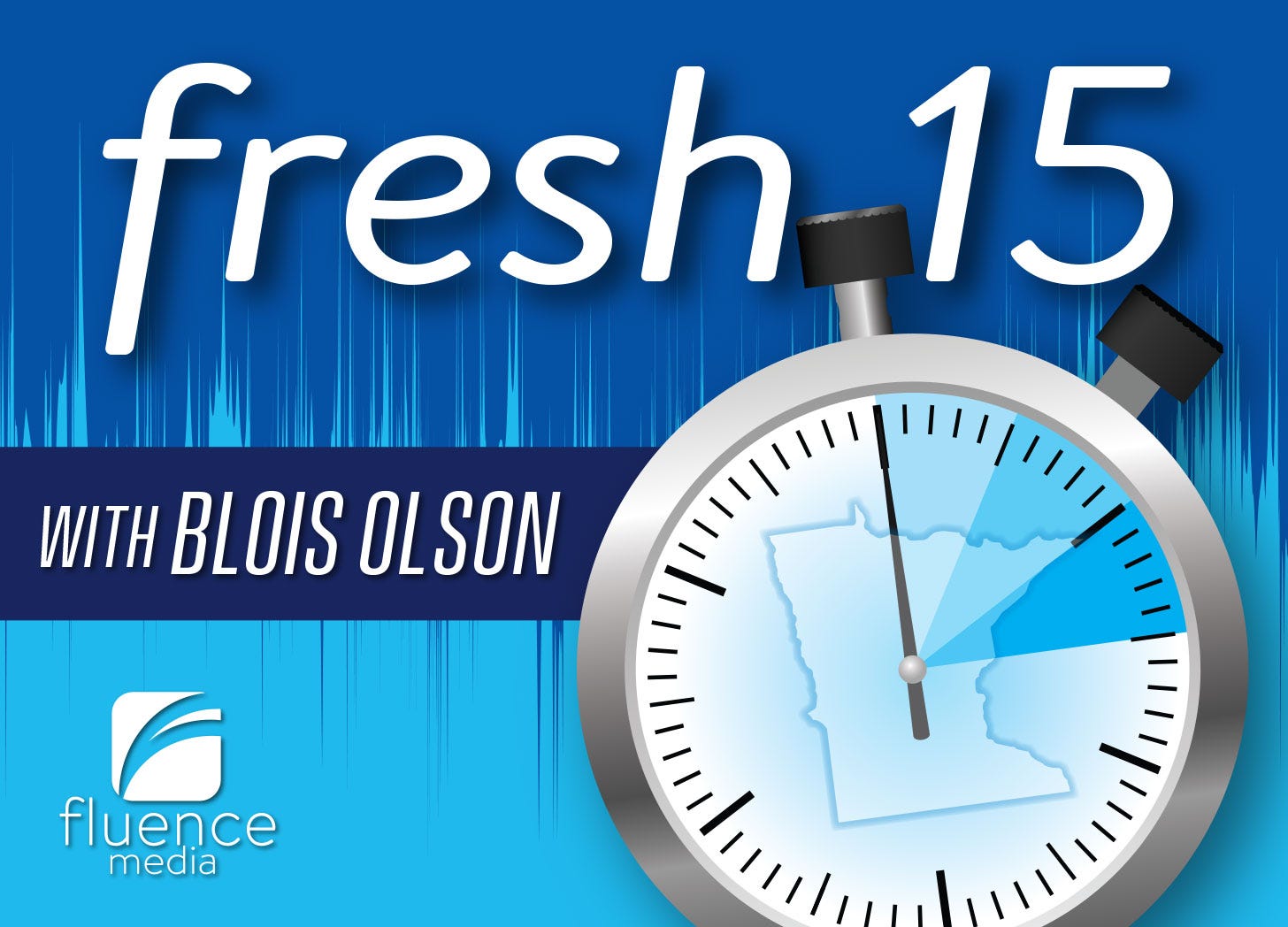FERTILIZER: Via Minnesota Corn, VERBATIM: “In the coming year, it is estimated that it will cost an average of $220 to fertilize an acre of corn in Minnesota, based on projected 2026 crop input and overhead costs and historical data from the University of Minnesota’s Center for Farm Financial Management/FINBIN. It’s the single largest expense for many farmers, and it represents a 55% increase over the average cost of fertilizer five years ago. The price farmers receive for a bushel of corn remains what it was five years ago. In recent written testimony submitted to Congress, Mark Mueller, president of Iowa Corn Growers Association, offered a grim assessment.” READ: https://fluence-media.co/43E4hQs (SPONSORED: Minnesota Corn Growers Association)
All Fluence Media tip sheets are now available to read and share online at our website, The Daily Agenda:
IMPACTING MINNESOTA FARMERS…
BANKRUPTCY: Via DTN, VERBATIM: “A series of failed business ventures and the Trump administration’s implementation of tariffs this past year are among the main reasons for the ultimate failure and filing for Chapter 11 bankruptcy protection by Omaha-based Hansen-Mueller Co., according to a declaration filed Monday in the U.S. Bankruptcy Court of Nebraska by the chief restructuring officer for the company. In addition, as Hansen-Mueller moves toward selling its assets, the company told the court it has identified more than 30 potential buyers. The company’s troubles began to surface late this summer into the fall when farmers across the country began to report not being paid by the company for grain.” READ: https://fluence-media.co/4o6I84D
MORE: Via MDA, VERBATIM: “Producers who have not received payment from Hansen-Mueller for grain sold in Minnesota are encouraged to submit a claim with the MDA. Farmers with warehouse receipts for grain in storage will need to contact the United States Department of Agriculture by email at warehousing@usda.gov. In 2023, the Minnesota Legislature created an indemnity fund. This fund is to protect Minnesota producers who have unpaid grain sales when grain buyers or warehouses become financially insolvent.” READ: https://fluence-media.co/3LGuacj
TRADE
SWITZERLAND: From MDA Commissioner Thom Petersen via X, VERBATIM: “Today in Zurich, Switzerland our Minnesota ag trade delegation met with Casale, a Swiss-based engineering and technology company that is an important partner in the new Morris, Minnesota green fertilizer plant.” SEE: https://fluence-media.co/4ra6bSV
CHINA: Via Brownfield, VERBATIM: “An ag economist at Ohio State University says he doesn’t expect China to purchase 12 million metric tons of U.S. soybeans before the end of the year. Ian Sheldon says there isn’t much incentive to make additional purchases, since China already has its necessary supplies.” SHELDON: “I think a lot of this is going to be driven by what the Chinese government is doing in terms of pushing its state traders to import soybeans,” he says. “Going into the new year, it’s going to depend on private traders and the relative price of American soybeans versus Brazilian soybeans.” LISTEN: https://fluence-media.co/4pjkYZO
Check out all the episodes of Sunday Take on 830 WCCO. CLICK: https://fluence-media.co/3VZAwp9
FRUIT
U OF M: Via University of Minnesota, VERBATIM: “The University of Minnesota today announced the launch of Superior Fruit Innovations (SFI), a new grower-focused licensing model. SFI is specifically designed to bring the U of M’s world-class new varieties to more growers and fruit lovers. For the first time, this model opens up exclusive U of M fruit varieties to direct-market growers who sell straight to consumers and local communities rather than through large distributors. Designed especially for growers of all sizes, SFI provides access to premium apple and table grape varieties, celebrated for the superior flavor, texture, and color that consumers recognize and value in local food systems.” MORE: https://fluence-media.co/3X5q2Vz
APPLES: Via NPR, VERBATIM: “What’s your favorite apple? Maybe it’s the crowd-pleasing Honeycrisp, the tart Granny Smith or the infamous Red Delicious. Either way, before that apple made it to your local grocery store or orchard it had to be invented — by a scientist. So today, we’re going straight to the source: Talking to an apple breeder. Producer Hannah Chinn reports how apples are selected, bred, grown ... and the discoveries that could change that process. Plus, what’s a ‘spitter’?” LISTEN: https://fluence-media.co/4oPEjSF
AFTER THE SHUTDOWN
FOOD SYSTEM: Via Grist, VERBATIM: “In a dramatic twist of political defections and contentious concessions, the longest ever federal shutdown came to a close late last Wednesday as Congress finally managed to agree on a deal to reopen the government. Government agencies are now beginning to resume operations, employees are returning to work, and federal payments are beginning to flow once again. Experts say, though, that the shutdown has left behind fractures on the nation’s food system that are only beginning to appear. These cracks will only widen with time as they join with all of the other major food and farming policy changes enacted by the Trump administration — which altogether are affecting who eats what, where that food comes from, and which communities get left behind.” READ: https://fluence-media.co/4o7daJM
ASSISTANCE: Via USDA, VERBATIM: “Three days after the government reopened and despite the radical left Democrat caused shutdown, President Donald J. Trump and U.S. Secretary of Agriculture Brooke L. Rollins continue to put Farmers First, including the unprecedented move to reopen over 2,000 county FSA offices in the middle of the government shutdown so farmers could continue to access U.S. Department of Agriculture (USDA) services during harvest. Today, the USDA will continue to support farmers and will release billions in disaster assistance for those recovering from natural disasters across the country.” READ: https://fluence-media.co/4r40oOH
PEOPLE…
NEXTGEN: Via Brownfield, VERBATIM: “Uncertainty in agriculture is making it even more difficult for new and beginning farmers. Minnesota Soybean Growers Association treasurer Rose Karau says the ag economy is in a multi-year slump and the outlook for next year seems bleak. ‘It’s super, what’s the word I would use? Uncertain.’ She tells Brownfield access to land remains highly competitive.” LISTEN: https://fluence-media.co/4pn8vEp
RETAIL: Via MDA, VERBATIM: “Eight Minnesota retailers who demonstrate excellence in locally grown and produced products have been named a 2025-2026 Minnesota Grown Retailer of the Year by the Minnesota Department of Agriculture’s (MDA) Minnesota Grown program, in partnership with the Minnesota Grocers Association (MGA). In addition to regional awards, a Beer, Wine, and Spirits category continues to recognize outstanding liquor retailers committed to local products, and one retailer was selected by public vote as the People’s Choice winner.” READ: https://fluence-media.co/4pn9ILX
FRESH15: The latest season of Fresh15 includes interviews with new Minnesota House members. So far, five new members have shared their goals, background and fun facts before they take office in a historic session this January.
Rep. Kari Rehrauer
Rep. Wayne Johnson
Rep. Julie Greene
Rep. Keith Allen
Rep. Peter Johnson
Follow on your favorite podcast platform, or at www.TheDailyAgenda.com/Podcasts. (SPONSORED: Minnesota Telecom Alliance)
FEEDING THE WORLD…
THANKSGIVING: Via MPR, VERBATIM: “An average 15-pound turkey could cost around $30 this Thanksgiving, according to an analysis from Purdue University. That’s a 25 percent price increase since October 2024 — a reversal from the relatively low prices of previous years. But why?” QUOTE: “Around this time of year, we typically see some price change,” said Caitlinn Hubbell, a researcher at Purdue who co-authored the analysis. “But right now, we’re seeing higher feed costs.” READ: https://fluence-media.co/487aFRw
ROOFTOP FARMS: Via Grist, VERBATIM: “If you’ve spent any time on a roof, you know that it’s not especially pleasant up there — blazing in the summer, frigid and windy in the winter. Slap some solar panels up there, though, and the calculus changes: Shaded from gusts and excessive sunlight, crops can proliferate, a technique known as rooftop agrivoltaics. And because that hardware provides shade, evaporation is reduced, resulting in big water savings. Plus, all that greenery insulates the top floor, reducing energy costs.” READ: https://fluence-media.co/4o5rqma
FARM-TO-KIDS: From MDA via X, VERBATIM: “A huge thanks to the @MNDeptEd and our Farm to Kids Alliance partners for working with us to help grow markets for farmers, strengthen local food systems, and nourish kids statewide. Read more about this work in our 2025 Farm to Kids Annual Report.” INFOGRAPHIC: https://fluence-media.co/4icBHM0
COMFORTING THE WORLD…
COWS: Via The Washington Post, VERBATIM: “Donald Scherber bought a Minnesota dairy farm in 1958. His son, John, bought it from him in 1995 and will probably pass it down to his children. For decades, the family has made a living selling the milk of their dairy cows. But recently, Scherber’s Morningstar Dairy has become known in the Minneapolis area for another business: cow cuddling. Donald Scherber’s grandchildren, Quinci Schmidt and Caleb Scherber, created the side business as a fun revenue source, charging visitors to cuddle their calves for 30 minutes at a time — while classical music plays in a pen.” READ: https://fluence-media.co/487oTC7
THE BUSINESS OF FARMING…
INNOVATION: Via Successful Farming, VERBATIM: “Dale Stevermer credits his father with making the greatest jump in efficiency on the family farm: bringing pigs inside the barn. ‘We went from a whole-herd feed efficiency of 4 pounds of feed to get 1 pound of pig out the door to now we’re in the 2-pound range,’ said Stevermer, who owns Trails End Farm in south-central Minnesota with his wife, Lori. About eight years ago the Stevermers stopped farrowing sows and instead solely custom-finish pigs. At the same time they fully transitioned to no-till on all 450 of their corn and soybean acres. They also grow cover crops on about 90% of the land and have added solar panels to offset electricity costs. All these changes were driven by a desire to do more with less, Stevermer said.” READ: https://fluence-media.co/4i8VhsD
TREATED SEED: Via Agweek, VERBATIM: “Minnesota farm groups recently called it a win when the Minnesota Pollution Control Agency withdrew rulemaking that farmers feel would have created burdensome and redundant regulations on their use of treated seed. Regulatory rulemaking by the Minnesota Pollution Control Agency, as directed by the Minnesota Legislature, sought to further define unused treated seed and detail permitted disposal methods. The MPCA’s withdrawal of rulemaking is due to a May report from an administrative law judge, which disapproved of the MPCA rulemaking because of procedural errors made by MPCA in the rulemaking process.” READ: https://fluence-media.co/4r6Ela8
LEASES: Via Brownfield, VERBATIM: “Many landowners seem hesitant to use flexible lease agreements. University of Minnesota Extension educator Nathan Hulinksy says there’s concern about risk.” HULINSKY: “The idea of sharing some of that profit and loss with the cyclical agricultural economy that we have (is the purpose of flex leases). The downside is you don’t know that bonus check amount until post-harvest because it’s dependent on yield.” LISTEN: https://fluence-media.co/4oLH2fF
FORUM: If you’re interested in having the Fluence Forum host a topic, please contact Blois Olson at bloisolson@gmail.com
FOSTER HORSE: Via news release from Minnesota Zoo, VERBATIM: “After falling ill just days after his birth in May, Marat, an Asian wild horse, was transferred to the University of Minnesota Veterinary Medical Center. He recovered and returned to the Zoo. But unfortuntately his mother, Nadyezhda, a first-time mom, no longer had the instinct to care for and nurse him. This is not an unusual circumstance with Asian wild horses when they are separated from their foals. Asian wild horses are critically endangered, and every individual is vital to saving the species. So, Zoo staff recruited a ‘foster mom,’ a domesticated horse named Alice, nurse and nurture him.” READ: https://fluence-media.co/4oSsjzN
Copyright © 2025 Fluence Media, All rights reserved.
As someone who subscribed, or as a member of the Minnesota AgriGrowth Council you are receiving this email.
Our mailing address is:
Fluence Media
PO Box 270031
Golden Valley, MN 55427







